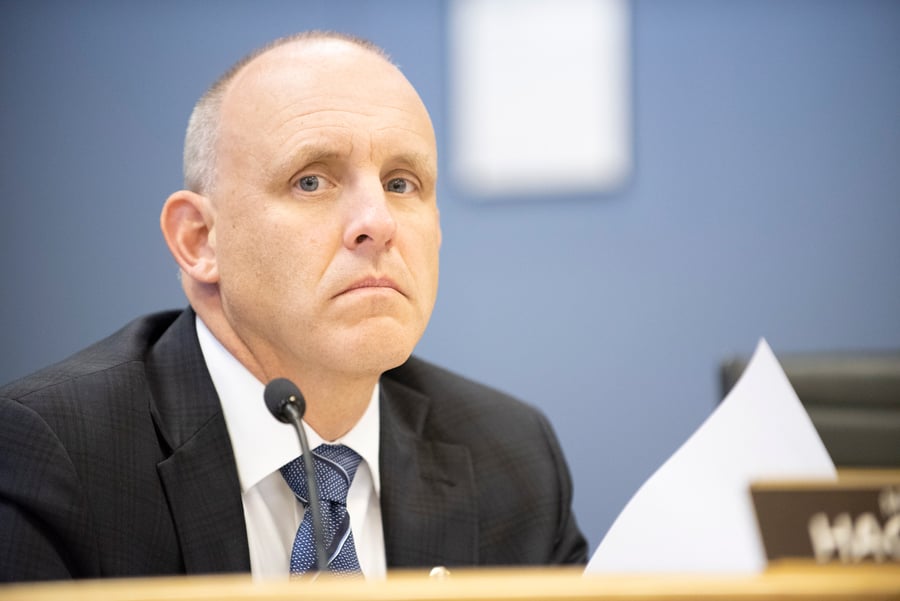Evanston in “mitigation stage” of COVID-19 response
Daily file photo by Colin Boyle
Mayor Steve Hagerty attends a city meeting. Hagerty called on residents to help slow the spread of coronavirus by practicing social distancing.
March 15, 2020
COVID-19 News
Evanston has left the “containment stage” of responding to the novel coronavirus and has now entered the “mitigation stage,” Health and Human Services Director Ike Ogbo said. This means that even if the virus cannot be contained, the city is working to slow its spread to possibly allow for more medical advances against the virus to be made.
Ogbo and Mayor Steve Hagerty live-streamed on Facebook on Tuesday to address residents’ questions about the virus, also known as COVID-19. While Evanston has no confirmed cases of COVID-19 NorthShore University HealthSystem is caring for a patient who has tested positive for the virus at one of its facilities. The Unitarian Church of Evanston has closed until at least March 18 due to a member of its congregation, who is not an Evanston resident, testing positive for the virus.
There are currently no antiviral drugs or vaccines to combat the virus, so nonpharmaceutical interventions, such as frequent hand-washing and staying home when feeling sick, are crucial to mitigating the spread, Ogbo said.
“There really isn’t much known about this virus,” Ogbo said. “The experts are still doing their research, and in order for one to attack a virus, you need to know its characteristics, you need to know its clinical profile. You need to know what the resulting illnesses or symptoms will be, and if there are any medical measures you can take with this virus.”
Both Hagerty and Ogbo recommended that residents socially distance themselves, including maintaining a distance of six feet from others, especially those that are sick. This practice minimizes the chances respiratory droplets from infected people can reach others.
Ogbo said transmission risk at public places like restaurants is still relatively low, and by taking measures like social distancing, visiting such places should be fine. He added that frequently disinfecting surfaces at those places can also reduce the risk.
Slowing the spread of the disease is a key goal for city leaders, and was the subject of Hagerty’s Thursday update, where he called on residents to flatten the potential curve of infection to make the virus easier for the healthcare system to handle.
“We have not done, as a country, a good job getting the test kits that we need,” Hagerty said. “But it is what it is, so part of this ‘biding our time’ and slowing this down is also to allow the medical supply chain to catch up to where we need it to be to treat people.”
Due to the lack of test kits, health officials have prioritized the most vulnerable to the disease and those who have traveled to areas with higher virus activity for testing. Evanston has also canceled senior activities indefinitely to reduce the chances one of Evanston’s elderly residents contracts the virus.
Ogbo said he hopes the testing requirements will relax soon to get a better sense of how the virus spreads, especially among asymptomatic people. He said he does not know when Evanston will be able to complete large-scale testing.
Among the city’s concerns are stigma and deteriorating mental health. Ogbo reported instances of stigmatization because of a person’s background or travel history, and urged residents not to contribute to such narratives.
Ogbo also called on Evanston residents to reach out virtually to those who may be isolated due to the virus, and to take care of themselves and their neighbors. Ogbo said to get help if you are experiencing stress, depression or feelings of being overwhelmed, as the virus can cause or exacerbate such conditions.
“With this virus and this situation, there’s a lot of anxiety, fear, apprehension,” Ogbo said. “Even uncertainty can cause health issues, because you don’t know if there’s light at the end of the tunnel.”
Email: emmaedmund2022@u.northwestern.edu
Twitter: @emmaeedmund



